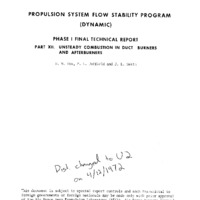-
Title
-
Propulsion System Flow Stability Program (Dynamic). Part XII. Unsteady Combustion in Duct Burners and Afterburners
-
Date
-
1968
-
Index Abstract
-
Coming Soon
-
Photo Quality
-
Not Needed
-
Report Number
-
AFAPL TR 68-142 Part XII
-
Creator
-
Dix, D. M.
-
Duffield, P. L.
-
Smith, J. E.
-
Corporate Author
-
North American Rockwell Corp Los Angeles CA Los Angeles Div
-
Laboratory
-
Air Force Aero Propulsion Laboratory
-
Extent
-
246
-
NTRL Accession Number
-
AD852024
-
Identifier
-
AD0852024
-
Access Rights
-
Export Control
-
Distribution Classification
-
1
-
Contract
-
F33615-67-C-1848
-
DoD Project
-
None Given
-
DoD Task
-
None Given
-
DTIC Record Exists
-
No
-
Distribution Change Authority Correspondence
-
PER AFAPL LTR
-
Date Modified
-
Scanned by request 8/3/2006 submitted by a Private Citizen (No Known Affiliation)
-
Abstract
-
An analytical model of combustion instability in afterburners and duct burners has been formulated which incorporates in a readily identifiable way the significant loss and gain processes associated with oscillatory combustion. The dominant loss mechanisms, as revealed by a literature survey and subsequent assessment, are those due to convection and radiation from the nozzle and absorption by acoustic liners. The gain mechanisms have been incorporated in a general way which permits physical interpretation; those mechanisms considered to be of most importance in aircraft burners are those associated with fuel vaporization and turbulent transport processes. The analytical model is also capable of treating approximately the significant nonlinear aspects of combustion instability associated with the dependencies of the major losses and gains on oscillation amplitude. The total mathematical requirements to obtain numerical results are the solution of transcendental algebraic equations and the evaluation of definite integrals. An application of the model to a known experimental situation yielded results which were qualitatively correct and quantatively of the correct order of magnitude. Finally, a test plan has been formulated to enable the adequacy of the analytical model to be further assessed.
-
Report Availability
-
Full text available
-
Date Issued
-
1968-12
-
Publisher
-
Wright-Patterson Air Force Base, OH : Air Force Aero Propulsion Laboratory, Air Force Systems Command
-
Provenance
-
Lockheed Martin Missiles & Fire Control
-
Type
-
report
-
Format
-
1 online resource
 AFAPLTR68-142part12.pdf
AFAPLTR68-142part12.pdf